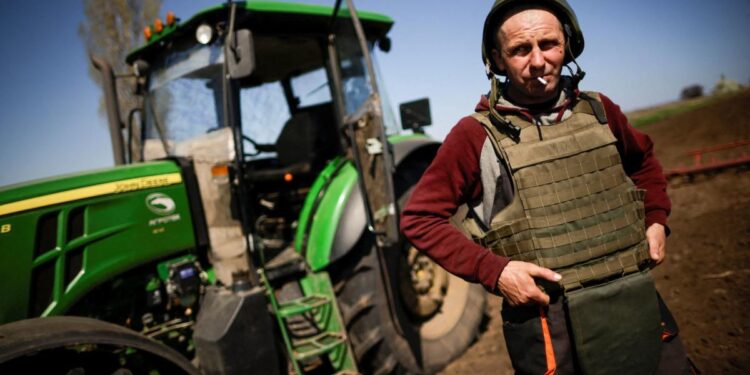by Miceál O’Hurley
KYIV — Ukraine’s Deputy Minister of Agrarian Policy and Food, Markiyan Dmytrasevych, announced this week that 2.5 million hectares (6,177,635 acres) of its black earth farmland has been rendered un-farmable since Russia’s full-scale invasion of Ukraine in 2022. According to the State Emergency Service this figure excludes land temporarily occupied by Russian forces. Anti-personnel and anti-armour mines and extensive ground contamination have made farming perilous if not impossible for thousands of farmers in Ukraine. The 2022-2023 planting seasons represent the largest loss of regularly and arable land under cultivation since Nazi-Germany and the U.S.S.R. conspired in 1939 with the illegal invasion and division of Poland which began World War II.
Andriy Dykun, head of the Ukrainian Agri Council (UAC) was quoted as saying every week Ukrainian farmers lose their lives by being “blown up by mines” in their fields. The UAC reports receiving daily reports of mines damaging or destroying agricultural equipment in attempts to put land under cultivation. “Small farmers often mine fields for sowing on their own, which has catastrophic consequences, as people die. Due to the threat to life, most farmers skip the sowing season altogether,” said Dykun. In the Kehrson region several large agricultural enterprises declined to take part in the sowing season citing abundant safety concerns.
It is impossible to use 2.5 million hectares, and this is without taking into account the land under the occupation of the aggressor country. This assessment was made by Markiyan Dmytrasevych, Deputy Minister of Agrarian Policy and Food of Ukraine, at a briefing at the Ukraine-Odesa Media Center.
“Approximately 2.5 million hectares of Ukrainian land are either mined or otherwise contaminated as a result of military operations, or require surveying for mines and other dangerous objects. This is the current assessment of the State Emergency Service,” the official said.
Meanwhile, the EU has reached a loggerhead with both Poland and Hungary who oppose grain shipments either to or through their jurisdictions. In mid-April Slovakia joined with Poland and Hungary in adopting a unilateralist denial of Ukrainian grain and other food products in an attempt to appease their domestic farm sectors. The agricultural bans apply to grains, dairy products, sugar, fruit, vegetables and meats. Although each acting unilaterally they have collectively agreed to keep the ban in force until the end of June.
The response from the European commission was swift asserting individual member States are not free to make individual trade policy within the EU. A statement by the European Commission’s spokesperson was blunt, “In such challenging times, it is crucial to coordinate and align all decisions within the EU.”
Historically, Ukraine relied on the Black Sea for export of the majority of its agri production. However, Russia’s full-scale invasion of Ukraine in 2022 cut-off unfettered access to maritime routes. Last Spring, the United Nations and Türkiye brokered a deal with Russia which would allow Ukraine to continue exporting by sea. However, according to Ukrainian officials, exports have been slow and complicated by Russia continuing to frustrate the exports by imposing over-zealous inspections. Russia denies the allegation it is not fully cooperating with the United Nations – Türkiye mediated agreement. The net result is that an increased amount of Ukrainian agri-goods have been travelling overland through Europe leaving poorer border countries to complain it is depressing domestic prices and creating a difficult situation for their farmers.
After Romania and Bulgaria also joined the unilateral ban on Ukrainian imports and transportation through their jurisdictions the European Commission brokered a deal with the five countries following Poland unilaterally lifting its ban without admitting it breached European policy regarding a universal agricultural policy. European Commissioner for Agriculture, Janusz Wojciechowski, announced last Friday the EU had reached an accommodation acceptable to all parties. The Agreement introduced a ban on imports of wheat, corn, rapeseed, sunflower seeds and sunflower oil in Poland, Slovakia, Hungary, Romania and Bulgaria. Transit of these Ukrainian goods through each jurisdiction would be allowed to continue. As part of the Agreement, the remaining eight types of agri products from Ukraine that Poland had previously banned, including poultry, eggs, honey and milk, are to be investigated by the European Commission to determine whether they destabilise the common market.
After reaching the agreement on Ukrainian agri products Wojciechowski said, “The free market is a fundamental principle of the EU, [and] not interfering in this market as long as possible is also the principle of the EU…Actions are only possible when serious market disturbances are confirmed.”
Ukraine strenuously objected to the unilateral acts of banning their agri products and/or disallowing transit of them through the various jurisdictions.
















































